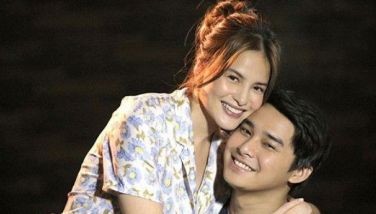Budoy: A deviant telenovela
MANILA, Philippines - Budoy, a teleserye that ended recently, contains the elements of a typical telenovela. There are bida and kontrabida, comic scenes, dramatic scenes, violence, sampalan blues, trite dialogue, poor-versus-rich conflict, greed for wealth and power, moral lessons regarding family values, and the triumph of good over evil.
Trials seem endless for the hero and the heroine, the grist of telenovelas that elicits sympathy from the viewer. And through the impenetrable “mysteries,” it’s baffling that supposed intelligent characters are clueless.
Budoy, furthermore, offers a few light moments and kilig effects where romantic love comes in. Love boggles the mind. It comes in a gust or gash of awakening. It wrings the heart. It flits and is fleeting. It breaks or makes one a better person.
Budoy, however, written by Philip King, and directed by Ruel Bayani and Tots Mariscal, also deviates from your usual formulaic, redundant, pedantic, circumvoluted or over-simplistic teleserye.
First of all, Budoy, an autistic child with flashes of genius, is not like your saintly Santino or your poor, exploited and oppressed Agua (of Agua Bendita). Budoy is neither pa-cute nor a fence sitter. Gerald Anderson, who plays Budoy, says in his interviews that he mixed with autistic children and observed their habits, mannerisms, way of talking, their interaction with children and adults, and their character traits. Thus, it’s the first time we get to see up close on television the physical, mental, and emotional makeup of a mentally-challenged person.
As a child, Budoy is a victim of kidnapping, masterminded by his grandma Alberta Maniego (Barbara Perez) and executed by grandma’s sons Anton (Tirso Cruz III) and Isaac (Christian Vasquez). The reason? The family of Alberta Maniego is a family of well-known doctors that owns a hospital and a school, and the family wants to hide an “abnormal” child in the family.
So, Budoy grows up in the care of Elena (Janice de Belen). Budoy’s biological mother Luisa (Zsa Zsa Padilla) sinks into depression from the loss of her son. In order to fill her emptiness, husband Anton adopts BJ, the son of Grace (Mylene Dizon), who pretends to be childless.
Budoy, BJ and friend Jackie (Jessy Mendiola) grow up to be the best of friends until they reach puberty, and BJ falls in love with Jackie, while Jackie considers BJ a bully and confuses her caring and admiration for Budoy as love. BJ soon finds out that his biological mother is Grace, and being an adopted son of the Maniegos, he becomes jealous of Budoy and turns problematic.
In the end, BJ rejects his parents and the life of crime, returns to the Maniegos, and embraces Budoy.
Second, the realities in the teleserye are shown as experiences of real people learning their lessons the hard way. There are no quick solutions to problems, no deus ex machina, walang himala. In fact, the viewer wonders all throughout, despite a few contrived scenes, how the plot will end. Instead of Jackie marrying Budoy (since Budoy is the bida), for instance, she weds BJ. When Jackie and BJ are shot dead, Budoy takes up yet another challenge: That of being a father to the orphaned baby. Instead of Grace ending up in prison or dying in a gun battle, she is resigned, as she loses her son, who means everything to her, to lead a life of hell under her gangster captor.
Third, the resolutions to conflicts are arrived at after much realization of the characters regarding their own selves, analyzing human relationships, and understanding and accepting human frailties as well as human virtues.
Fourth, most interesting about Budoy is the delineation of the well-rounded characters. Everyone loves deeply, gets hurt, explodes in anger and is irrational and rational according to the situation at hand. BJ, though at times stubborn and impulsive, is willing to sacrifice life and happiness for the sake of Budoy and Jackie. But when he discovers that Jackie loves Budoy as a friend and BJ as a probable lifetime partner, BJ declares his love for Jackie. This stabs Budoy’s heart, but he, with the intuition and innate intelligence, soon accepts the fact that Jackie deserves a “normal” family life, and that they can all still be best friends.
Jackie is the most complex character of all. A woman of few words, Jackie is an obedient daughter, but sets the bounds when her mother becomes unjust. She shows courage in defending Budoy. She listens to other people’s advice. She employs words of persuasion and love. But she controls her life and destiny by making her own decisions. And she does so with patience, timing and compassion.
Budoy, again, is a deviant telenovela as it doesn’t make fun of mentally-challenged individuals. The autistic, the retardate, the marginalized are part of society, a society that only needs its awareness to be raised. For once, in a full-length telenovela, we get to look at the world through the eyes of a mentally-challenged individual.
- Latest
- Trending






























